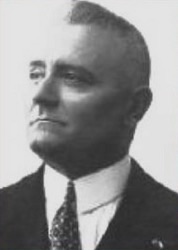Cesare Mori
|
The Honourable Cesare Mori |
|
|---|---|
 |
|
| Member of the Italian Senate | |
|
In office 10 January 1928 – 5 July 1942 |
|
| Monarch | Victor Emmanuel III |
| Prefect of Palermo | |
|
In office 1 November 1925 – 1 June 1929 |
|
| Prefect of Trapani | |
|
In office 2 June 1924 – 12 October 1925 |
|
| Prefect of Bologna | |
|
In office 8 February 1921 – 20 August 1922 |
|
| Police commissioner of Castelvetrano | |
|
In office 1909 – January 1915 |
|
| Personal details | |
| Born |
22 December 1871 Pavia, Kingdom of Italy |
| Died | 5 July 1942 (aged 70) Udine, Friuli, Kingdom of Italy |
| Nationality | Italian |
| Political party | National Fascist Party |
| Spouse(s) | Angelina Salvi (m. 1897–1942); her death |
| Alma mater | University of Palermo (Hd) |
| Profession | Soldier, police officer, politician |
| Religion | Roman Catholicism |
| Military service | |
| Nickname(s) | "The Iron Prefect" |
| Allegiance |
|
| Service/branch |
|
| Years of service | 1895–1898 |
| Rank | Soldier |
| Battles/wars | None |
Cesare Mori (Pavia, December 22, 1871 – Udine, July 6, 1942) was a prefect (prefetto) before and during the Fascist period in Italy. He is known in Italy as the "Iron Prefect" (Prefetto di Ferro) because of his iron-fisted campaigns against the Mafia on Sicily in the second half of the 1920s.
Mori was born in Pavia and grew up in an orphanage and was only recognised by his natural parents in October 1879 at the age of seven. He studied at the Turin Military Academy. However, he married a girl, Angelina Salvi, who did not have the dowry stipulated by military regulations of the time, and had to resign. He joined the police, serving first in Ravenna, then Castelvetrano in the province of Trapani (Sicily) – where he made his name capturing the bandit Paolo Grisalfi – before moving to Florence in 1915 as vice-quaestor.
At the end of the First World War, the situation of Sicilian criminality got worse when war veterans joined gangs of bandits. In 1919 Mori was sent back to Sicily as the head of special forces against brigandage. In his roundups, Mori distinguished himself for his energetic and radical methods. At Caltabellotta he arrested more than 300 people in one night. The press wrote of a "lethal blow to the Mafia", but Mori said to a member of his staff :
These people haven't understood yet that brigands and the Mafia are two different things. We have hit the first, who are undoubtedly the most visible aspect of Sicilian criminality, but not the most dangerous one. The true lethal blow to the Mafia will be given when we are able to make roundups not only among Prickley Pears, but in prefectures, police headquarters, employers' mansions, and why not, some ministries.
In 1920, he returned to the mainland and served in Turin as quaestor, followed by Rome and Bologna. In 1921 he was prefect of Bologna, and was one of the few members of the forces of law and order to oppose the organised thuggery (squadrismo) of the Fascist movement. Mori was removed and sent to Bari. He retired with his wife to Florence in 1922, when the Fascist leader Benito Mussolini took over the government after the March on Rome.
...
Wikipedia
